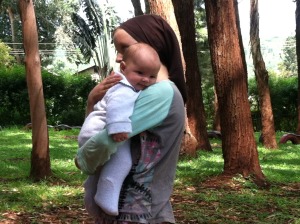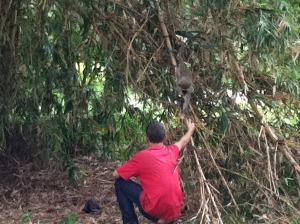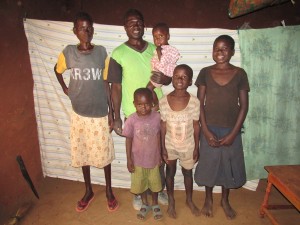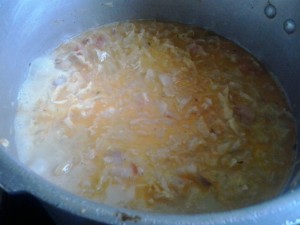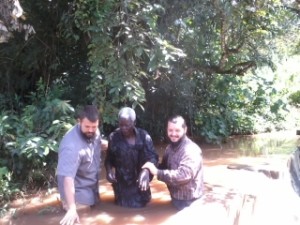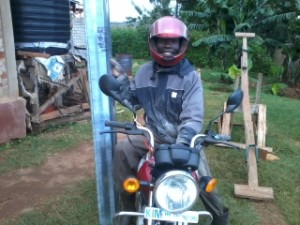I was blogging a lot when we first moved to Kenya; it was quite a therapeutic way to process the transition and also to let folks know what was going on with our family. Slowly, I stopped, as life on the mission field got quite busy and I tried to get back into a new groove with homeschooling, which had been reduced to rather bare-bones with the move. I’m still not where I want to be in terms of homeschooling, but our oldest completed his GED last year at age 16, so I’m somewhat optimistic that we’re moving in the right direction.
 Blogging when our children were young was easy; there were so many sweet moments I wanted to document. And when there were challenges, they were the small problems of small children (which don’t feel so small when you’re a weary Mom to many Littles, so I don’t say that lightly!) Now that they’re bigger children with bigger problems and there is privacy to protect, it’s hard to know what to say and what not to say in this space. But, I suppose I can talk about me, so if you’d give me the grace to do so, I’d like to share some thoughts as we have just welcomed blessing number 9 to our family, baby Joanna (born in September 2015).
Blogging when our children were young was easy; there were so many sweet moments I wanted to document. And when there were challenges, they were the small problems of small children (which don’t feel so small when you’re a weary Mom to many Littles, so I don’t say that lightly!) Now that they’re bigger children with bigger problems and there is privacy to protect, it’s hard to know what to say and what not to say in this space. But, I suppose I can talk about me, so if you’d give me the grace to do so, I’d like to share some thoughts as we have just welcomed blessing number 9 to our family, baby Joanna (born in September 2015).
Being a new Mom again at age 42, after 4-1/2 years of thinking that I was done with babies, has been an interesting experience. I always knew that children were a blessing, but Baby Joanna really feels like one! They say you can’t spoil a baby, but she is held more and loved more than any baby before her. There are few times I feel compelled to just let her cry, but those times that I do, one of her big sisters comes to her rescue! Not only do I have many hands to help with the baby, but also many hands to help with housework and meal preparation. It is a totally different experience than coming home with our first, second, third, fourth, and even fifth children! If you are a Mom of young children now, I promise you, it is so worth the investment in your children as you teach, train, encourage, and equip them with practical life skills and an attitude of service. It is tiring while you’re doing it (believe me, I know!)…that precept upon precept, capturing those “teachable moments” of correction (which usually happen at the most inconvenient times, or happen so often that you feel you get precious little else done!). BUT, perseverance has its perfect work and it is a blessing to see the fruit of years and labor in the Lord.
No, our children are not perfect; I would never claim that. But, neither am I. Yet I cling to the promise of a word that was spoken to me many years ago now. It was during a “revival”-type church service where a guest preacher brought a fiery sermon and ended with a very meaningful time of prayer. I had gone without my husband, who was away on business, and with my 5 young children, aged about 9 on down to 1. I don’t know what compelled me to go, since the service started just about when I would have been putting the kids down to bed. And all Mamas know that you just don’t mess with bed time. I went anyway…seeking more of the Lord and needing some encouragement, if I remember correctly. I fully expected at least two of the children to melt down, but 9:00 came and went and the evening went on in prayer. I figured I’d gotten as much as I would get (though I can’t even tell you now what the sermon was about), so I slipped out of the back row and started making toward the rear exit with all the children. I remember silently congratulating myself on the fact that we were doing so without disrupting the focused prayer that was in progress. Then, the speaker at the front of the sanctuary happened to lift his head as I looked up from one of my Littles at the back door. Our eyes met. He spoke rather loudly: “I have a word for you today!” and suddenly all heads lifted and all eyes were on me. I felt like I could have melted into the floor–and wanted to! But he came to the back where I was and spoke many encouraging words about children and family to me. He even spoke specific words over each of my older children. I wish I could remember them now. Bu then he came to me. He spoke about my weariness as if he knew. And these are the words I remember…words that have echoed over the years and continued to encourage me when things have been hard: “You’re not Super Woman! You’re not a super wife. You’re not a super mother. But what you can’t do, God can.”
I knew it to be true. I still know it to be true. And it’s not just true for me–it’s true for all of us! No matter where you are in this journey of mothering–physically weary Mom of Littles, or emotionally weary Mom of older children, certain of the outcome of your efforts (which sometimes God mercifully allows us to be), or uncertain…know that God can. Like the little boy who brought five loaves and two fish to Jesus, and ended up feeding a multitude, bring your offering every day to Jesus and know that He will do with it what you can’t. Bring your tear-wiping, your hugs, your pats on the back, the Bible-reading, the encouraging (even if you’re discouraged yourself), the kindness when you feel irritable…the list goes on and on. We do when we feel like we can’t do any more. We invest in what seems like a lost cause. We give out of our emptiness. And God knows. He takes those feeble efforts and does what only He can. I’m still living that, but I know it to be true. It’s true for me, and it’s true for you. Press on, Mama.

